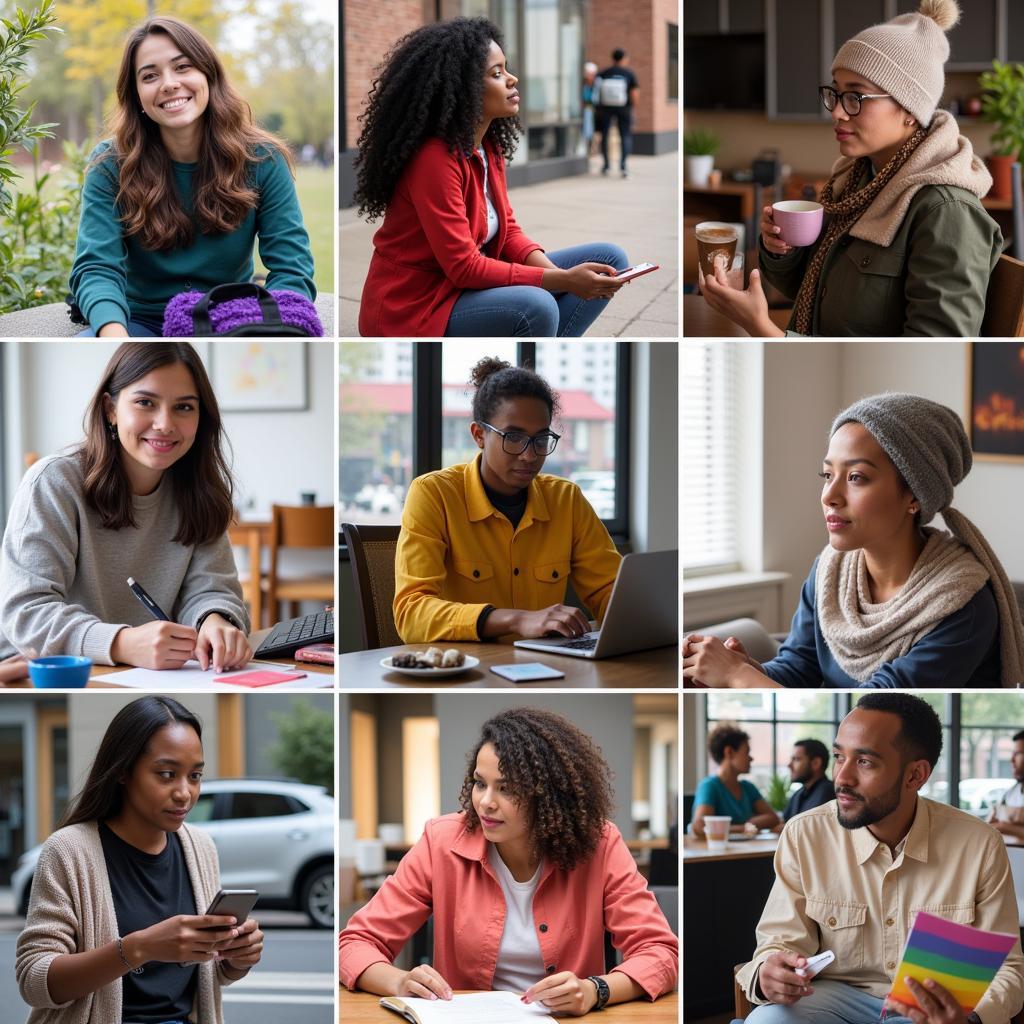The relationship between Individual And Society is a fundamental aspect of human existence, shaping our values, beliefs, and actions. From the moment we are born, we are both shaped by and contribute to the intricate tapestry of society. This dynamic interplay influences every facet of our lives, from our personal relationships to our collective progress as a global community.
The Individual as a Product of Society
We enter this world as blank slates, our minds eager to absorb the norms, values, and beliefs of the society we are born into. Through a process known as socialization, we learn the rules of engagement, acceptable behaviors, and the expectations placed upon us as members of a particular group. This process is ongoing throughout our lives, evolving as we encounter new experiences and engage with different social circles.
 A young child learning social norms
A young child learning social norms
Our families, education systems, peer groups, and the media all play a pivotal role in shaping our individual identities. Family, as the first point of contact, lays the foundation for our moral compass, instilling values and beliefs that often stay with us throughout our lives. As we enter the education system, we are exposed to a broader range of perspectives and taught the skills necessary to navigate the complexities of the social world. Peer groups offer opportunities to test boundaries, develop social skills, and form bonds based on shared experiences. Meanwhile, the media bombards us with messages that shape our perceptions of beauty, success, and acceptable behavior.
It’s crucial to recognize that society isn’t a monolithic entity. We are part of multiple social groups, each with its own set of norms and values. This intersectionality – be it based on race, gender, religion, sexual orientation, or socio-economic background – further adds to the complexity of our individual identities.
The Individual’s Contribution to Society
While society significantly influences who we are, it’s essential to remember that individuals also have the power to shape and reshape society. Just as we are products of our social environment, we are also active agents capable of influencing and changing the world around us.
Our individual actions, no matter how small they may seem, contribute to the collective conscience of society. Every act of kindness, every voice raised against injustice, every innovative idea, can create a ripple effect, influencing those around us and contributing to positive change.
 People volunteering in their community
People volunteering in their community
History is replete with examples of individuals who have challenged the status quo, sparking social movements and driving significant societal shifts. From Rosa Parks’ refusal to give up her seat on a bus to Malala Yousafzai’s unwavering advocacy for girls’ education, countless individuals have demonstrated the power of one voice to ignite change.
The Dichotomy of Individualism and Collectivism
The relationship between individual and society is often framed as a dichotomy between individualism and collectivism. Individualistic cultures emphasize personal goals, autonomy, and self-reliance, while collectivist cultures prioritize group harmony, interdependence, and the well-being of the community over individual desires.
However, this dichotomy is not absolute. Most societies exist on a spectrum, incorporating elements of both individualism and collectivism in varying degrees. Understanding this nuanced interplay is crucial for fostering cross-cultural understanding and building bridges between different communities.
Finding Harmony in the Individual and Societal Dynamic
The dynamic interplay between individual and society is a constant source of tension and harmony. While society provides a framework for our lives, it’s essential to recognize our individual agency and responsibility to challenge unjust norms and strive for a more equitable and compassionate world.
“The true measure of any society can be found in how it treats its most vulnerable members,” said Mahatma Gandhi. As individuals, we have a moral imperative to use our voices and actions to create a society that values the inherent dignity of every human being and strives for a future where peace and justice prevail.
Conclusion
The intricate dance between individual and society is a complex and multifaceted phenomenon. By understanding this dynamic interplay, embracing our individual agency, and working collaboratively, we can create a world where every individual has the opportunity to thrive and contribute to a more just and peaceful society for all.
FAQs
1. How does society shape our identities?
Society shapes our identities through socialization, influencing our values, beliefs, and behaviors through family, education, peer groups, and the media.
2. Can individuals change society?
Yes, individuals can and do change society through their actions, ideas, and advocacy. History is filled with examples of individuals who have sparked social movements and brought about significant change.
3. What is the difference between individualism and collectivism?
Individualism emphasizes personal goals and self-reliance, while collectivism prioritizes group harmony and the well-being of the community.
4. How can we find balance between individual needs and societal expectations?
Finding balance requires understanding and respecting both individual needs and societal expectations, engaging in open dialogue, and working collaboratively towards solutions that benefit both.
5. What is the role of education in the individual-society relationship?
Education plays a crucial role in fostering critical thinking skills, promoting understanding of diverse perspectives, and empowering individuals to become active and responsible members of society.
Need Help?
If you need support in your peacebuilding journey, please contact us:
Phone: 02043854663
Email: [email protected]
Address: Khu 34, Bac Giang, 260000, Vietnam
Our dedicated team is available 24/7 to provide guidance and support.